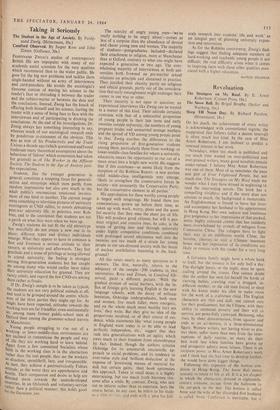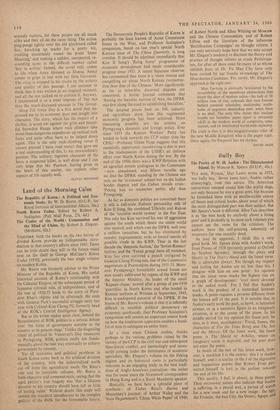Revaluation
The Strangers on My Roof. By E. Arnot Robertson. (Cresset Press, I8s.) The Snow Ball. By Brigid Brophy. (Seeker and Warburg, los.) Sleep Till Noon Day. By Richard Purslow. (Heinemann, 18s.)
ON his death, the achievement of every writer is acknowledged with conventional regrets; the reappraisal that follows (after a decent interval) is often much less kind. In the case of Miss Arnot _Robertson, I am inclined to predict a renewed interest in her work.
Nowadays, when too much is published and too much time wasted on over-publicised and over-praised writers, many good novelists remain under-valued. I believe Miss Arnot Robertson was one of them. Most of us remember the pace and plot of Four Frightened People, but not much else. The Strangers on My Roof made me wonder what I may have missed in neglecting to read the intervening novels. The book has a compelling vividness and if the story does not amount to much, the background is memorable. An Englishwoman is. forced to leave her lover and accompany her husband to his appointment in Hong Kong. Her own sadness and loneliness give poignancy to her impressions of that packed, noisy, highly coloured colony that has suddenly been overwhelmed by crowds of refugees from Communist China. The refugees have to fight their way in an indifferent world. Chloe, the heroine, chooses to visit a Chinese tenement house and her impression of its conditions are likely to remain with the reader for a very long time.
A fortunate family might have a whole bunk to itself, but the tenancy .is for only half a day. The daylight .hours, or the night, must be spent trailing around the streets. One cannot doubt that the author has seen for herself the horde of starving babies crawling over a drugged, in- different mother; or the old man forced to sleep with his knees under his chin to make room for the work of a craftsman child. The English characters are thin and dull; one cannot care for their predicament, but the Chinese, with their ability to surmount poverty and their will to survive, are powerfully conveyed. Honuong, who rises, by sheer determination, from squalor and ends as an air-hostess, is a three-dimensional figure. Women writers, not having wives to pro- tect them, suffer more than men from the inter-
ruptions of daily routine, so many their best work late when families have grown up and prosperity admits more leisure. There is an incipient power in Miss Arnot Robertson's work and I think had she had time to develop further, she would have done bigger things.
Following this exposure of the human con- dition in Hong Kong, The Snow Ball seems scarcely to relate to life at all. It is a feu d'esprit in which the characters, dressed in eighteenth- century costume, escape from the ballroom to the car-park or the bed. The hostess is called Anne and the wife of her discarded first husband is called Anna. Confusion is inevitable, but it scarcely matters, for these people are all much alike and they all do the same thing. The action ping-pongs lightly over the old playboard called Sex, knocking up marks for a pretty wit, trickling uncertainly round the point 'Inner Meaning,' and making a sudden, unexpected, re- sounding score in the difficult runway called 'Sex in action.' Indeed, the novel only comes to life when Anna (dressed as Donna Anna) comes to grips in bed with her Don Giovanni. The critic is stopped in his tracks by the artistry and quality of this passage. I any inclined to think that it was written in an inspired moment, and all the rest tacked on to contain it. Anyway, I recommend it as a truer impress of The Act than the much-discussed passage in The Group.
Sleep Till Noon Day is a first novel that im- pressed me by its economy, pace and insight into character. The story, which has the impact of a thriller, is acted out against the grim and beauti- ful Snowdon Range where rock climbers take more-than-dangerous expeditions up vertical rock faces and quite often have to be helped down again. This is the only rock-climbing novel (I cannot pretend I have read many) that gave me a real understanding of this, to me, extraordinary passion. The solitary, ingrown character of the hero, a suspected killer, is well done and I can only hope that Mr. Purslow, having given us the heart of this matter, can explore other aspects of life equally well.
OLIVIA MANNING



































 Previous page
Previous page